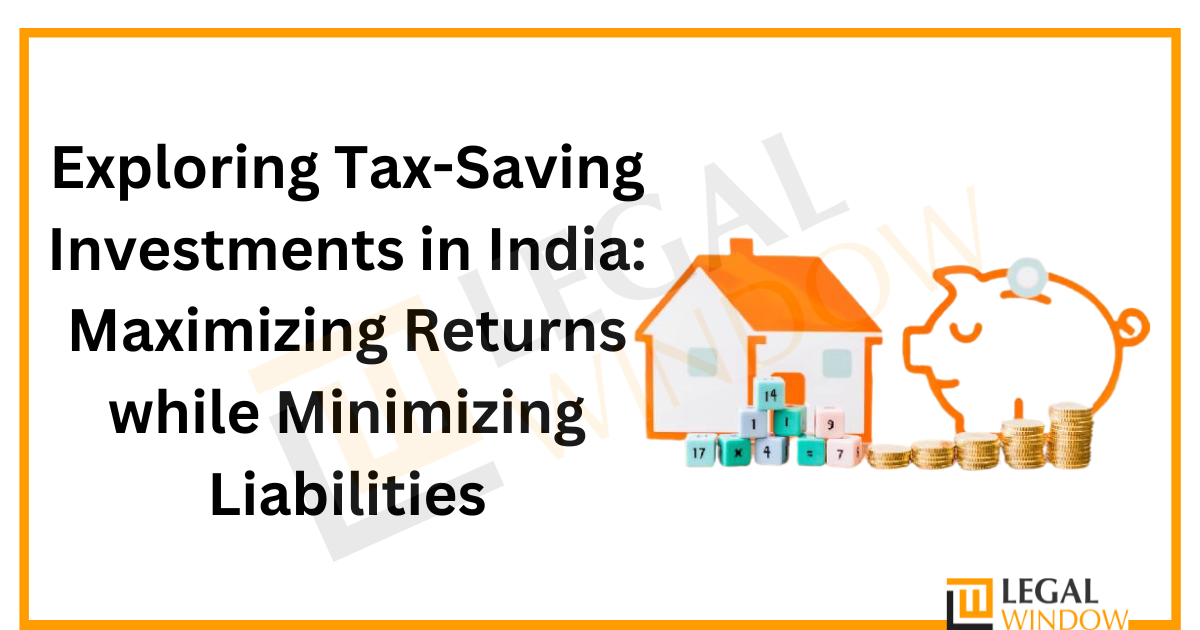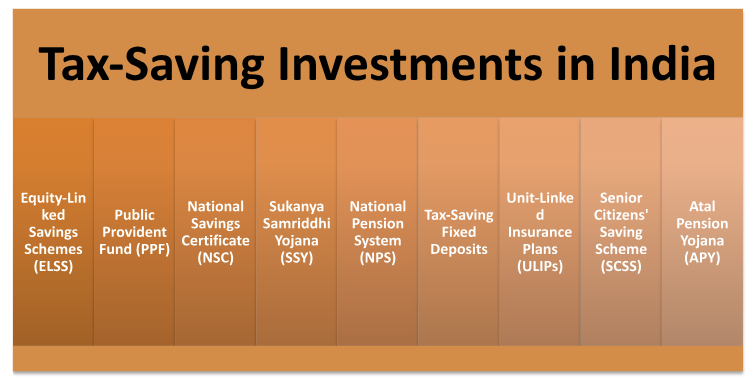Exploring Tax-Saving Investments in India: Maximizing Returns while Minimizing Liabilities
- September 12, 2023
- Income Tax

The concept of Tax Planning is an important aspect of personal financial management for a country like India. It is crucial to explore the benefits of tax-saving options applicable in the country. Individuals can reduce their tax liabilities with the appropriate investment choice but it also aims to build a strong foundation for the financial future. In this article we will try to provide an overview of the various tax-saving investments in India, also we will try to highlight their benefits, features, and considerations.
| Table of Content |
Best Tax Saving Schemes & Investments in India
Managing taxes is one of the important aspects of financial planning, and in a country like India, where taxation plays a significant role in the financial journey of the country and individual it becomes essential to go through the various tax-saving investments in India. These investment options not only help individuals in the reduction of their tax liability but also provide the instrument for the creation of wealth and financial security.
Financial management includes the concept of tax planning for both individuals and organizations. Good tax planning affects greatly a person’s financial well-being. In India, where the tax system is complex and multidimensional, good financial planning helps the taxpayer to meet their financial goals. The taxpayer can opt for sound financial tax planning by utilizing the different exemptions, deductions, and incentives offered by the Indian Government. And, figuring out the strategic decisions helps in lawfully reducing the tax burden.
The Income Tax Act, of 1961 with the help of its Section 80C, enables individuals and Hindu Undivided Families (HUFs) to the deduction from specific investments from the total income. The maximum amount of deduction that may be deducted under this clause is 1.5 lakh rupees for every fiscal year. It is pertinent to note that both salaried employees and independent contractors are eligible for deduction under Section 80C benefits and it proves to be the best investment plan for tax benefits in India.
Best Tax Saving Investment Schemes in India
Numerous investment programmes in India are made to assist taxpayers in reducing their tax obligations. Equity-Linked Savings Schemes (ELSS), ULIPs, PPF, EPF, Mutual funds, and Insurance plans are some examples of the several best investment plans for tax benefit in India. These investment plans provide additional benefits, risks and awards based on the investor’s demands, upon the risk tolerance, time frame, and financial goal.
The Indian government through these various instruments encourages taxpayers to take part in tax-saving programmes by furnishing them with the tax benefits on investments made by them in the specific instruments by the implementation of Section 80C of the Income Tax Act, 1961. These tax-saving options help the taxpayer in lowering or reducing their tax obligations while increasing their long-term wealth.
Based on the taxpayer’s need, risk tolerance, investment planning, and tax rate, the appropriate tax saving schemes in India will be decided. Before taxpayers finalize an appropriate investment strategy, taxpayer needs to get expert guidance to ensure that it aligns with their financial goals and the applicable criteria for tax-saving strategies.
Implementation of Tax Saving Investments in India
In India, many investors are eligible to use tax-saving investment plans based on their investment objectives and risk tolerance. These programmes are for the taxpayer who wants to reduce their tax obligation and wants to invest for the long term, and for the creation of wealth.
The ELSS funds, PPF, EPF, ULIPs, and tax-saving mutual funds are some examples of tax-saving investments in India. Under Section 80C of the Income Tax Act, 1961, the investors are eligible to deduct up to INR 1.5 lakh from their taxable income, these tax-saving investments provide additional tax advantages.
These investment schemes are created to deliver higher returns in a longer period, which makes it appropriate for the taxpayer who has long-term investing goals. But it is also important to note that there are several risks which are associated with these investment programmes, or schemes. So, it is advisable for prospective buyers to carefully consider their financial condition before they make a purchase.
As a result, the investment objectives of an individual, the risk tolerance, and the tax circumstances affecting the best Tax Saving Schemes and investments in India are applicable or not. To make an informed investment option, investors should take the help of a financial advisor before they choose tax-saving investing possibilities.
Exploring Tax-Saving Investments in India
The following are some tax-saving investments in India:

- Equity-Linked Savings Schemes (ELSS): ELSS funds are amongst the most popular tax-saving investment options for individuals who are seeking exposure to equities while simultaneously enjoying tax benefits. These mutual funds have a specific lock-in period of three years, which is comparatively shorter than other tax-saving instruments. ELSS funds equip the taxpayer with the potential for higher returns because of their equity exposure; however, they are also equipped with higher volatility.
- Public Provident Fund (PPF): The PPF is a form of long-term government-backed tax savings scheme that provides tax benefits under Section 80C and also it offers the advantage of compounding. PPF has a lock-in period of 15 years, the PPF is one of the conservative options which is suitable for risk-sensitive investors. The interest rates on PPF are subject to revision every quarter and they are usually higher than those of the other fixed-income instruments.
- National Savings Certificate (NSC): The NSC is a form of fixed-income savings instrument having a lock-in period of five or ten years, which is based on the variant chosen. NSC offers various tax benefits under Section 80C and it is ideal for investors who are looking for a secure government-backed option having predictable returns.
- Sukanya Samriddhi Yojana (SSY): Sukanya Samriddhi Yojana comes to promote the financial security of the girl child. This Yojana provides tax benefits in addition to an attractive interest rate. Parents or guardians of a girl child can open an SSY account for their daughters, and these funds can be then used for the education or marriage expenses of the girl child. The SSY scheme has a lock-in period, also partial withdrawals are allowed under certain circumstances.
- National Pension System (NPS): NPS or National Pension Scheme is a long-term retirement savings scheme that provides additional tax benefits under Section 80CCD. NPS offers a mix of equity and debt investment options, NPS allows individuals to choose their preferred asset allocation. It also has a partial withdrawal facility and it aims to provide financial security during retirement of the taxpayer.
- Tax-Saving Fixed Deposits: Many banks or financial institutions offer several tax-saving fixed deposits. Tax- Saving Fixed Deposit has a lock-in period of five years. The interest earned on Tax Saving Fixed Deposit is taxable, and the principal amount of investment qualifies for tax benefits under Section 80C. These deposits provide capital protection and they are suitable for conservative investors who prefer fixed returns.
- Unit-Linked Insurance Plans (ULIPs): The ULIP Scheme combines the insurance and investment components. It allows the individuals to invest in a variety of funds which is based on risk tolerance. This scheme offers tax benefits under Section 80C and Section 10(10D) on maturity proceeds. However, it is advised that investors should carefully take into account the charges associated with ULIPs before investing.
- Senior Citizens’ Saving Scheme (SCSS): As the name suggests, the Senior Citizen Saving Scheme was created for senior citizens. This Scheme offers tax benefits under Section 80C and provides for regular investment interest. SCSS has a lock-in period of 5 years which is extendable for an additional 3 years.
- Atal Pension Yojana (APY): Atal Pension Yojana is a government pension scheme that is aimed at unorganized sector workers. This scheme offers tax benefits under Section 80CCD. APY provides a fixed pension amount after the retirement of the investor; it also helps individuals secure their financial future.
Important points of consideration regarding tax-saving investments in India
Here are some important points to keep in mind regarding tax-saving investment in India:
- Understand Your Goals: Before the individual gets into tax-saving investments, the taxpayer must define their financial goals. Whether it is for wealth creation, retirement planning, or saving for any specific needs, your investment goal must be by your objectives.
- Choose the Right Instruments: India as a country offers a variety of tax-saving investment options under Section 80C of the Income Tax Act, 1961. For example Equity-Linked Saving Schemes (ELSS), Public Provident Fund (PPF), National Savings Certificate (NSC), and many more. You should evaluate each option based on risk tolerance, lock-in period, and returns.
- Risk Profile: Taxpayer should assess their risk tolerance before they make any investment decisions. Equity-based investments have higher market-associated risks, on the other hand, fixed-income options offer higher returns.
- Lock-in Period: Most tax-saving investments have a lock-in period during which you cannot withdraw the invested amount. Taxpayer should consider their financial needs and financial commitments before committing to any particular investment.
- Professional Advice: Seeking advice from financial experts can provide additional assistance to the particular individual situation, helping you make informed decisions.
When it comes to tax-saving investments in India, Legal Window has a team of specialists who will offer you the best advice, the quickest delivery, and the highest level of customer satisfaction. Please contact our team for Tax Planning at 072407-51000 or admin@legalwindow.in.
Conclusion
In conclusion, it can be said that India as a country offers a variety of tax-saving schemes and investments that fulfil the requirements of different risk appetites and financial goals. It is essential to analyze your capacity towards risk tolerance, scope of investment, and financial objectives before selecting the right tax-saving option. You should be guided by a long-term perspective. this enables you to maintain a balance between minimizing your taxes and maximizing your wealth.
CA Pulkit Goyal, is a fellow member of the Institute of Chartered Accountants of India (ICAI) having 10 years of experience in the profession of Chartered Accountancy and thorough understanding of the corporate as well as non-corporate entities taxation system. His core area of practice is foreign company taxation which has given him an edge in analytical thinking & executing assignments with a unique perspective. He has worked as a consultant with professionally managed corporates. He has experience of writing in different areas and keep at pace with the latest changes and analyze the different implications of various provisions of the act.
Categories
- Agreement Drafting (23)
- Annual Compliance (11)
- Change in Business (36)
- Company Law (148)
- Compliance (90)
- Digital Banking (3)
- Drug License (3)
- FEMA (17)
- Finance Company (42)
- Foreign Taxation (6)
- FSSAI License/Registration (14)
- GST (118)
- Hallmark Registration (1)
- Income Tax (200)
- Latest News (34)
- Miscellaneous (164)
- NBFC Registration (8)
- NGO (14)
- SEBI Registration (6)
- Section 8 Company (7)
- Start and manage a business (21)
- Startup/ Registration (128)
- Trademark Registration/IPR (40)
Recent Posts
- Post incorporation compliances for companies in India April 30, 2024
- Startup’s Guide to Employee Stock Ownership Plans April 29, 2024
- Master Secretarial Audit: A Complete Compliance Guide April 27, 2024
About us
LegalWindow.in is a professional technology driven platform of multidisciplined experts like CA/CS/Lawyers spanning with an aim to provide concrete solution to individuals, start-ups and other business organisation by maximising their growth at an affordable cost.









